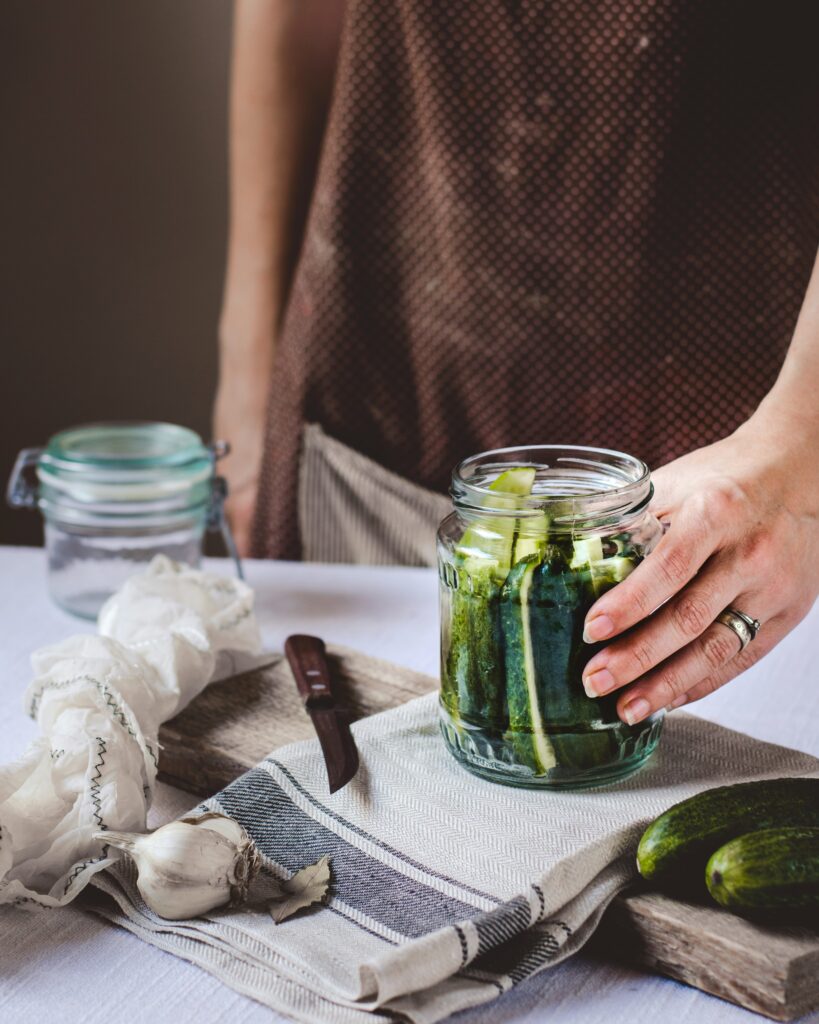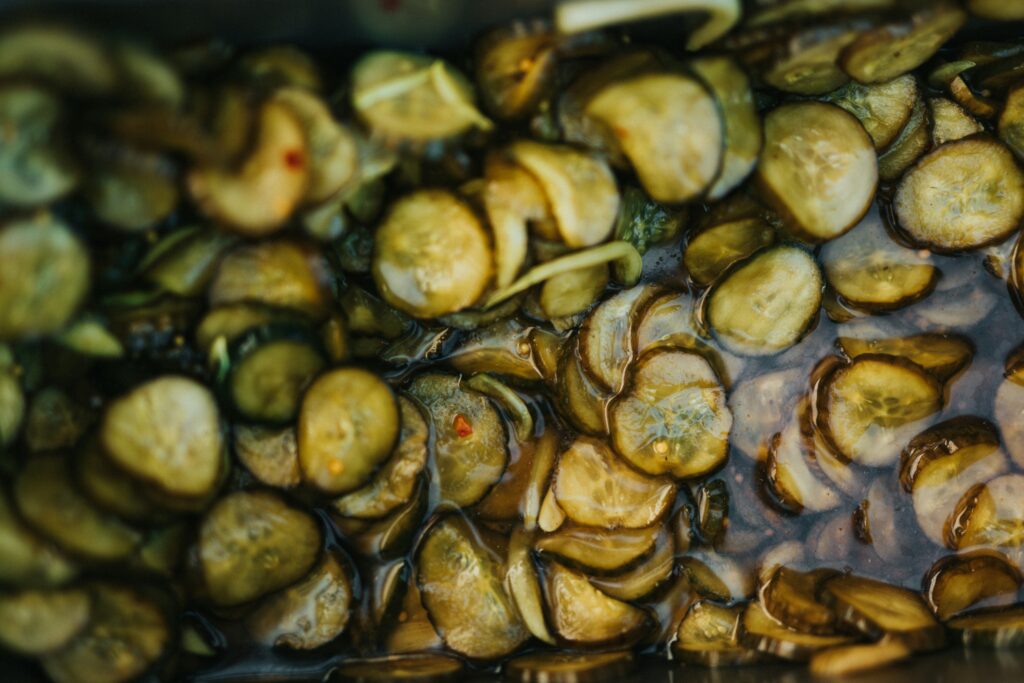If you’re searching for a tasty and refreshing way to shed those extra pounds, you might be surprised to learn that pickles could be the answer you’ve been looking for. These tangy and crunchy delights have been gaining attention for their potential role in weight loss. Packed with flavor and low in calories, pickles can make a satisfying addition to your diet. But just how effective are they? In this article, we’ll explore the question, “Can pickles aid in weight loss?” and uncover the facts behind this intriguing notion. Get ready to discover a delicious twist on your weight loss journey!

This image is property of images.unsplash.com.
Nutritional Content of Pickles
Calories
Pickles are known for being low in calories, which makes them a great snack option for anyone looking to manage their weight. One medium-sized pickle contains only about 20 calories, making it a guilt-free choice for those watching their calorie intake.
Protein
While pickles might not be a significant source of protein, they still contribute a small amount to your overall protein intake. Protein is an essential nutrient that helps build and repair tissues in the body. Although pickles alone may not provide a significant amount of protein, they can still be enjoyed as part of a balanced diet that includes other protein-rich foods.
Carbohydrates
Pickles have a minimal amount of carbohydrates, making them a suitable option for those following a low-carb or ketogenic diet. While they do contain some carbohydrates, the amount is relatively small, with around 4 grams per medium-sized pickle.
Fiber
Pickles are surprisingly high in fiber, considering their low-calorie content. Fiber is essential for maintaining a healthy digestive system and can aid in weight loss. A medium-sized pickle contains approximately 2 grams of fiber, contributing to your daily fiber needs.
Vitamins and Minerals
Although pickles may not be a significant source of vitamins and minerals, they do contain small amounts of certain nutrients. For example, pickles made with cucumbers provide a modest amount of vitamin K, which is important for blood clotting and bone health. Additionally, pickles made with vinegar can be a source of acetic acid, which may have its own health benefits.
Low in Calories
Explanation of low-calorie content
Pickles are low in calories primarily because they are made by fermenting cucumbers in a brine solution. This fermentation process enhances the flavor while keeping the calorie content minimal. The absence of additional oils or fats in most pickles further contributes to their low-calorie nature.
Comparison with other snacks
When compared to other commonly consumed snacks, pickles prove to be a much healthier option. For instance, a medium-sized bag of potato chips can contain over 150 calories, while a handful of pickles would hardly amount to 20 calories. By replacing high-calorie snacks with pickles, you can reduce your overall calorie intake and support your weight management goals.
High in Fiber
Importance of fiber for weight loss
Fiber plays a crucial role in weight loss and overall well-being. It adds bulk to your diet, makes you feel fuller for longer, and helps regulate bowel movements. By including adequate amounts of fiber in your diet, you can control your appetite, reduce overeating, and ultimately manage your weight more effectively.
How pickles contribute to fiber intake
Despite being low in calories, pickles are surprisingly high in fiber. The cucumbers used in pickles retain their fiber content during the fermentation process, making them an excellent source of dietary fiber. Including pickles in your meals or enjoying them as a snack can boost your fiber intake and support your weight loss journey.
Vinegar and Weight Loss
Effect of vinegar on metabolism
Vinegar, a key ingredient in many pickles, has been studied for its potential impact on weight loss. Some research suggests that consuming vinegar may help increase fat oxidation and enhance metabolism. This means that including vinegar in pickles or other vinegar-containing foods in your diet might support your weight loss efforts.
Potential impact on weight loss
While the exact mechanism by which vinegar aids in weight loss is still being explored, incorporating vinegar-containing foods like pickles into a balanced diet can be a beneficial strategy. However, it’s important to remember that pickles alone cannot replace a healthy lifestyle and should be consumed as part of a well-rounded weight loss plan.

This image is property of images.unsplash.com.
Gut Health and Weight Management
Role of gut microbiota in weight regulation
The gut microbiota, the trillions of bacteria residing in our digestive system, has emerged as a key player in weight management. A healthy and diverse gut microbiota has been linked to better weight control and overall well-being. By nourishing our gut bacteria, we can potentially support weight loss and improve our overall health.
Beneficial bacteria in pickles
Pickles made through fermentation are rich in probiotics, which are beneficial bacteria that promote a healthy gut environment. These probiotics can improve gut health, aid digestion, and potentially influence weight management. Including pickles in your diet can help maintain a diverse gut microbiota, supporting your weight loss goals.
Satiety and Reduced Caloric Intake
The feeling of fullness after consuming pickles
Despite their low-calorie content, pickles can create a sense of fullness and satisfaction due to their high water and fiber content. The combination of these factors helps curb hunger cravings and reduce the chances of overeating. As a result, incorporating pickles into your meals or enjoying them as a snack can contribute to reduced caloric intake.
Effect on overall food consumption
By including pickles in your diet, the feeling of fullness they provide can help regulate your overall food consumption. When you feel satisfied after eating food that is low in calories, you are less likely to reach for high-calorie alternatives. This, in turn, can support your weight loss journey by reducing your overall caloric intake.

This image is property of images.unsplash.com.
Hydration and Weight Loss
The water content of pickles
Pickles, being made through the fermentation process, retain a significant amount of water. This high water content contributes to the overall hydration provided by pickles. Staying properly hydrated is essential for weight loss, as it helps maintain optimal bodily functions, supports metabolism, and aids in appetite control.
Importance of hydration for weight loss
Hydration is often overlooked when it comes to weight loss, but it plays a crucial role in supporting your goals. Drinking an adequate amount of water helps maintain proper bodily functions, including digestion and metabolism. By including water-rich pickles in your diet, you can contribute to your overall hydration and enhance your weight loss efforts.
Sodium Content and Water Retention
Sodium levels in pickles
One aspect to consider when consuming pickles is their sodium content. The brine used in pickle production typically contains salt, resulting in pickles being relatively high in sodium. While sodium is an essential nutrient, excessive intake can lead to water retention and hinder weight loss efforts. It’s essential to moderate your pickle consumption if you’re watching your sodium intake.
Impact on water retention and weight
Excessive sodium intake can cause your body to retain water, leading to temporary weight gain due to bloating. By practicing moderation in your pickle consumption and being mindful of your overall sodium intake, you can mitigate the potential impact of sodium on water retention and support your weight loss journey.

Pickles as a Healthy Snack Option
Comparison to high-calorie snacks
When looking for a healthy and low-calorie snack option, pickles stand out as an excellent choice. Compared to high-calorie snacks like chips, cookies, or candy, pickles provide a satisfying crunch and tangy flavor while contributing significantly fewer calories. Incorporating pickles into your snacking routine can help satisfy cravings while keeping your calorie intake in check.
Inclusion in a balanced diet
While pickles can be a healthy snack option, it’s important to remember that they should be consumed as part of a balanced diet. Pickles alone cannot provide all the necessary nutrients your body needs. By incorporating pickles alongside other nutritious foods, you can enjoy their benefits while still maintaining a well-rounded and diverse diet.
Moderation and Individual Variations
Importance of moderation in pickle consumption
Although pickles can offer various health benefits, it’s crucial to practice moderation in their consumption. While they are low in calories, a high sodium intake can be detrimental to your health. Additionally, overeating pickles could lead to a disruption in your daily nutrient balance. Moderation is key to reaping the benefits of pickles while maintaining a healthy overall diet.
Individual differences in weight loss journey
It’s important to recognize that everyone’s weight loss journey is unique, and what works for one person may not work for another. While pickles can be a valuable addition to a weight loss plan, each individual may have different dietary needs and preferences. It’s essential to listen to your body, consult a healthcare professional if needed, and tailor your pickle consumption accordingly.
In conclusion, pickles can be a beneficial addition to a weight loss plan due to their low-calorie content, high fiber, probiotic content, and potential impact on hydration and metabolism. However, it’s essential to consume pickles in moderation and as part of a balanced diet. While they can contribute to weight loss efforts, individual variations in dietary needs should always be considered. By incorporating pickles wisely into your eating habits, you can enjoy their tangy goodness while supporting your goal of a healthy weight.


